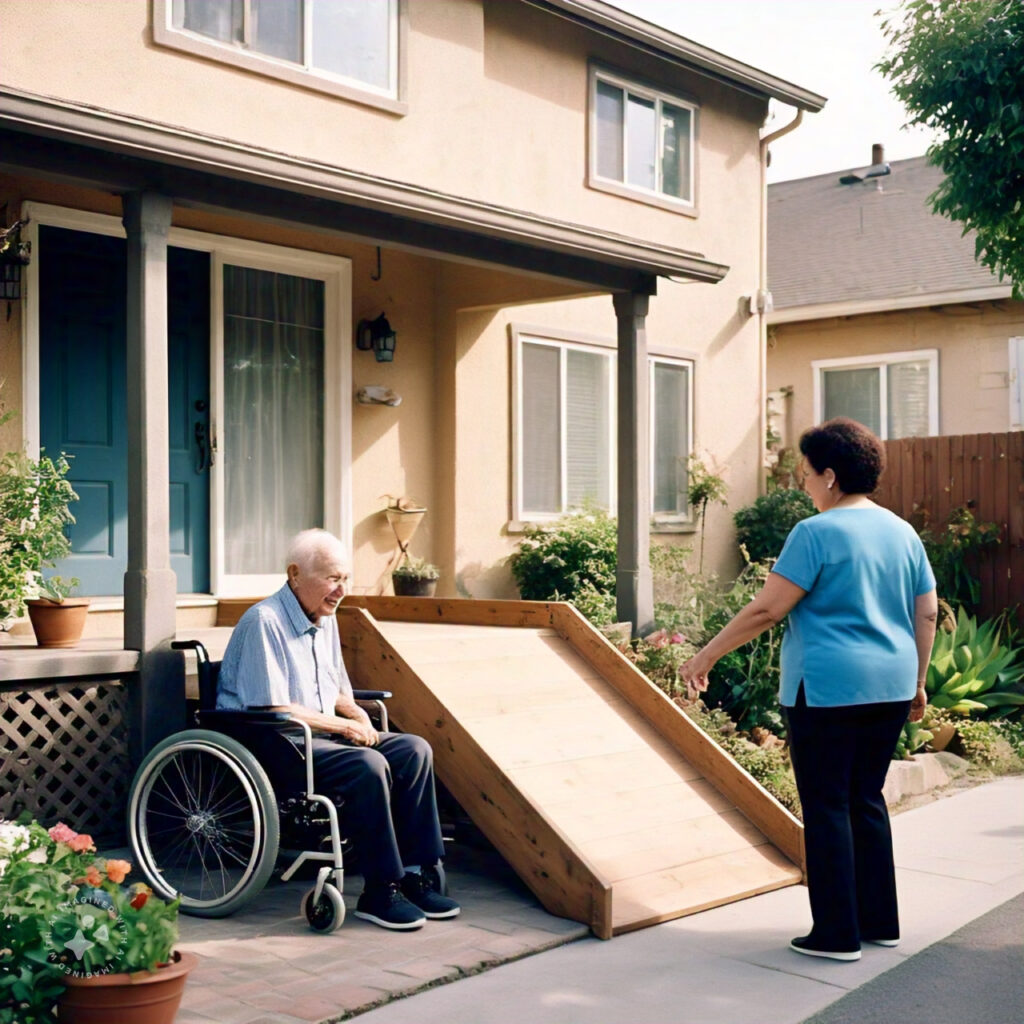Caring for a loved one who is elderly, blind, or disabled can feel overwhelming. Families often struggle to find the right support to help relatives live safely and comfortably at home. Without proper guidance, they may worry about costly long-term care facilities or complex medical rules that make it hard for family caregivers to get paid for their time and effort. But there is good news for Colorado residents seeking a better solution. Enter the Elderly, Blind, and Disabled (EBD) Waiver—an essential Colorado Medicaid program that allows older adults and people with disabilities to receive care right where they feel most at ease: in their own homes.
This article will help families and individuals in Colorado understand the EBD Waiver and how it connects to In-Home Support Services (IHSS) and other Home and Community-Based Services (HCBS). It will show readers how to become paid caregivers for their loved ones through recognized programs like the Parent CNA Program. By reading this, anyone who cares for an aging parent, a disabled family member, or a loved one struggling with health issues will learn the steps to become involved, find resources, and discover how Colorado’s health care system can work in their favor. Get ready to understand the EBD Waiver from top to bottom and feel confident taking the next steps.
Why the EBD Waiver Matters for Colorado Residents

The Colorado Department of Health Care Policy and Financing has created several supports to help people stay at home rather than move to a nursing facility. Among these supports is the EBD Waiver, which is part of the broader category of Home and Community-Based Services (HCBS). This waiver opens up opportunities to use Medicaid funding for home-based care, so individuals receive the help they need while avoiding institutional settings.
The EBD Waiver matters because it removes certain strict rules that often limit a family’s ability to care for their loved ones at home. Through this waiver, everyday tasks like health maintenance and personal care can be handled by family caregivers who receive proper training and pay. It makes care more accessible, more personal, and often less expensive than long-term care in a facility.
For older individuals, people with blindness, and those with disabilities, this program can be life-changing. It allows them to remain in familiar surroundings and maintain independence. For their families, it provides a pathway to support loved ones without sacrificing their own financial stability or personal well-being.
How the EBD Waiver Connects With IHSS
The EBD Waiver serves as a gateway to In-Home Support Services (IHSS), a vital aspect of Colorado Medicaid Programs. IHSS supports clients who need hands-on care or skilled health-related tasks at home. One key detail is that the EBD Waiver allows clients to be enrolled in IHSS, which “waives the Nurse Practice Act.” This allows caregivers who are not licensed nurses or certified nursing assistants (CNAs) to perform some skilled tasks under the IHSS model. These tasks might include medication reminders or assistance with non-invasive medical equipment—duties that typically require a nurse or licensed professional.
When someone enrolls in the EBD Waiver and selects IHSS as their service delivery option, their chosen caregiver—possibly a family member—can now provide a wider range of care. This flexibility encourages more personal, responsive home care that meets the individual’s unique needs without requiring them to hire outside professionals for every small task. To learn more about the IHSS program details, visit the official Colorado Department of Health Care Policy and Financing In-Home Support Services page. For additional information and a helpful overview, you can also explore resources at 1forAllHHC IHSS page.
Key Benefits of the EBD Waiver for Families and Caregivers
- Greater Independence for Clients:
Under the EBD Waiver, clients can stay in their own homes, making everyday life more comfortable and maintaining personal freedoms. - Family Caregivers as Paid Providers:
The EBD Waiver allows family caregivers to be compensated for providing both health maintenance and personal care services. However, it is important to note that homemaker services are not covered. This means a family member can assist with a feeding tube, help with a catheter, or perform other skilled tasks, even without a nursing license, and receive payment for their time. - IHSS for Adults:
Through the waiver, adults who require support due to age, blindness, or disability can receive IHSS services. This ensures that a family caregiver—or a caregiver of their choice—can meet their health care needs in a safe, supportive environment. - Reduced Caregiver Burnout:
Family caregivers often provide help around the clock. By allowing family members to be paid and trained to deliver health-related tasks, the EBD Waiver acknowledges their value and eases financial burdens. This can reduce stress and improve the overall quality of care. - Access to Trusted Providers and Resources:
Colorado’s health policies make it possible to have a network of case managers, provider agencies, and organizations that can guide families through each step. Resources such as the Colorado Department of Health Care Policy and Financing EBD Waiver page offer official information, and the CMA and CCB Agency Directory can help locate key contacts.

How To Enroll in the EBD Waiver Program
Enrolling in the EBD Waiver involves working closely with a case management agency. These agencies help determine eligibility, set up services, and connect clients to authorized provider agencies. Each step aims to ensure that individuals receive the care they need in the right amount and setting.
Step 1: Contact a Case Management Agency
The first step is to find a local case management agency (CMA) or a Community Centered Board (CCB) that can guide you. They will ask for personal and medical information to understand your needs. Once they have this information, a case manager will be assigned. This person will be your go-to point of contact, helping you navigate the enrollment process. For assistance, you can visit the CMA and CCB Agency Directory to find agencies serving your area.
Step 2: Eligibility Determination and Enrollment
Next, the case manager will determine if the individual meets the EBD Waiver’s eligibility requirements. These typically include financial and functional criteria. The goal is to confirm that the person needs a certain level of care that might otherwise be delivered in a nursing facility or institutional setting. If the individual qualifies, the case manager will help them enroll.
Step 3: Choosing a Provider Agency
Once enrolled, it’s time to select a provider agency for the IHSS program. Provider agencies serve as the backbone of home care services. They handle the administrative side of paying caregivers, training, and ensuring quality care. Different agencies pay differently, so it can be helpful to compare a few. Some might offer higher rates, additional training, or more flexible scheduling. Don’t be shy about asking questions to find the best fit for your family.
Navigating the IHSS for Adults and Family Caregivers
For adults who qualify under the EBD Waiver, IHSS expands the circle of care. It allows for tasks like medication reminders, non-invasive health maintenance, personal hygiene, and mobility assistance to be done by trusted caregivers in the home. Family caregivers, who know their loved ones best, can now perform certain skilled activities without needing a nursing license or CNA certificate, provided these tasks do not require the clinical judgment of a nurse.
This shift is not only convenient but also empowering. It reflects an understanding that many everyday health tasks can be taught to dedicated family caregivers, increasing their confidence and involvement in the care of their loved ones. It also helps clients feel more at ease, knowing the people they trust are the ones providing their care. For more information on IHSS and how it works with the EBD Waiver, visit Colorado’s IHSS page.
The Role of the Parent CNA Program and Other Supports

In some situations, a parent or close relative may take on caregiving duties for a child or adult family member. Colorado’s Medicaid programs understand that family caregivers play a key role in ensuring quality home care. The Parent CNA Program, for example, allows a parent to become a certified nursing assistant and be paid through Medicaid for specific tasks.
While the EBD Waiver itself allows family caregivers to perform certain skilled tasks without a CNA license, becoming a CNA can open doors to more complex supports and possibly better pay rates. It also offers structured training, ensuring that the caregiver is well-prepared to handle a variety of health-related tasks.
In addition to the Parent CNA Program, there are other supports and resources in Colorado to guide family caregivers. Nonprofit organizations, local community centers, and case management agencies can provide education, respite care, and emotional support. These services make it easier for families to sustain their caregiving roles long-term, knowing they have a strong network behind them.
Frequently Asked Questions (FAQ)
Q: Does the EBD Waiver cover homemaker services provided by family caregivers?
A: Under the EBD Waiver, family caregivers cannot be paid for homemaker services. They can be paid for health maintenance and personal care tasks that do not require the clinical judgment of a nurse.
Q: How do I know if I qualify for the EBD Waiver?
A: Contact a case management agency to begin the eligibility process. They will review financial and medical criteria to determine if your situation meets the EBD Waiver requirements.
Q: Can my spouse or adult child be my paid caregiver?
A: Yes. Under the EBD Waiver and IHSS, certain family members can serve as paid caregivers, provided they complete required training and registration through a provider agency.
Q: Does the EBD Waiver allow a caregiver without a CNA or nursing license to perform skilled tasks?
A: Yes. The EBD Waiver “waives” certain Nurse Practice Act restrictions so that family caregivers can handle some skilled tasks that do not need the judgment of a nurse or CNA.
Q: Where can I find more information on IHSS?
A: Visit the Colorado Department of Health Care Policy and Financing IHSS page or review additional resources at 1forAllHHC IHSS page.
Conclusion: Moving Forward With Confidence and Care
The Elderly, Blind, and Disabled Waiver stands as a shining example of Colorado’s commitment to helping people remain in their own homes with dignity and independence. By connecting individuals to In-Home Support Services, it allows family caregivers to offer vital health and personal care tasks, even if they are not licensed medical professionals. This approach can ease financial pressure, reduce stress, and foster a supportive environment where loved ones thrive.
Families seeking to enroll in the EBD Waiver or IHSS should first reach out to a case management agency, determine eligibility, and find the right provider agency to meet their needs. With the right guidance, they can create a care plan that benefits everyone involved.
This week, consider taking the first step: If you know someone who could benefit from the EBD Waiver or IHSS, contact a case management agency listed in the CMA and CCB Agency Directory. Starting the conversation can open doors to new opportunities and help your loved one access the support they deserve right at home.

